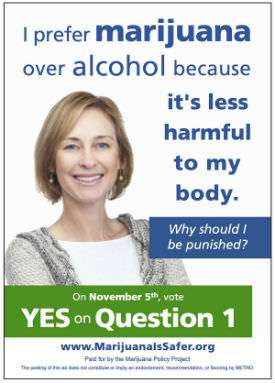The First Amendment Even Protects Speech That Offends Pot Prohibitionists

Next week voters in Portland, Maine, will decide whether to repeal local penalties for possession of up to two and a half ounces of marijuana by adults 21 or older. The ballot initiative, Question 1, will not affect state law, which treats possession of amounts below that cutoff as a civil violation punishable by fines ranging from $350 to $1,000, although local legalization might influence the enforcement priorities of Portland police. While the practical impact of Question 1 may be minor, the campaign's messaging, if successful, is apt to influence efforts to fully legalize marijuana in Maine and other states. The campaign's ads, which are displayed on the sides of buses and bus shelters in Portland's transit system, feature harmless-looking marijuana consumers who explain why they prefer pot to alcohol. "I prefer marijuana over alcohol because it is less harmful to my body," says one. "Why should I be punished for making the safer choice?" The ad urges people to "vote yes on Question 1" and includes the address for a Marijuana Policy Project website that compares cannabis to alcohol.
According to McClatchy DC, this message, which is a variation on the approach that seems to have worked in Colorado, really bugs anti-pot activists, who say it should not be allowed:
Opponents say the ads go well beyond endorsing a ballot measure, instead promoting an illegal product. They say the ads shouldn't be allowed in places where they're so easily viewed by youths, including high school students who ride city buses to school.
An anti-drug group called 21 Reasons has asked the Greater Portland Transit District to take down the ads. "What we say and what we do is being watched by the kids in our communities," Jo Morrissey, a spokeswoman for the group, tells McClatchy, "and they look to us for clues on what's acceptable and what's normal and how they should act." Kevin Sabet, executive director of the prohibitionist group Project SAM, agrees that the Question 1 ads pose an intolerable risk to the youth of America. "We're witnessing the birth of Big Marijuana," he says, "and I really worry about the messages this advertising is going to be sending to kids, giving them the impression that marijuana is safe."
Unlike Jo Morrissey, the Greater Portland Transit District has heard of the First Amendment. The sides of Portland's buses are what the Supreme Court calls a "designated public forum," and restricting that forum to speech that Morrissey and Sabet like would be clearly unconstitutional. "We're allowing this message because it's political speech," explains Gregory Jordan, the transit agency's general manger. "It's designed to help change a law….We don't have a position on the content of the advertising, just that it's a political message and by its very nature it's protected by the First Amendment."
Even when it perturbs pot prohibitionists? How can that be?


Show Comments (20)